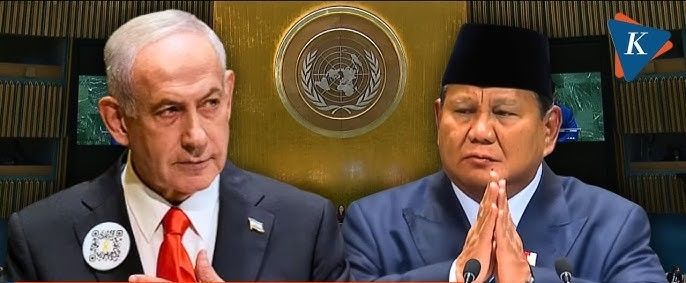AT the United Nations Summit on the Question of Palestine on Sept 22, President Prabowo Subianto declared a commitment to “immediately recognise the state of Israel” once Tel Aviv recognises the independence and statehood of Palestine. Many found this surprising, as it marks a departure from Indonesia’s long-standing stance of not normalising relations with or recognising Israel.
As of today, Indonesia, along with dozens of other states (mostly from the Muslim world), has not recognised Israel. Several other countries have even severed their diplomatic relations with Israel in light of the genocide taking place in Gaza which started on Oct 7, 2023.
While those who support Prabowo’s statement regard the move as a new diplomatic strategy to elevate Indonesia’s role in supporting the two-state solution, we must approach this development critically.
Recognition of Israel should not be taken lightly as a mere shift in diplomatic stance, as it carries a deeper significance for Indonesia. In 1955, Indonesia hosted a historic conference, widely recognised as the birthplace of Global South solidarity and South-South cooperation, known as the Bandung Conference, which laid the foundation for the Non-Aligned Movement.
Among the core principles of the conference was full support for the right to self-determination of peoples and nations. Up to 29 Asian and African states attending the conference emphasised that this principle is “a prerequisite for the full enjoyment of all fundamental human rights.”
The right to self-determination gives peoples the freedom to “freely determine their political status and freely pursue their economic, social and cultural development”. The Bandung Conference was a significant moment in the decolonisation movement, bringing together some of the most influential figures of the newly independent world, including Jawaharlal Nehru of India, Zhou Enlai of China, Gamal Abdel Nasser of Egypt and Indonesia’s first president, Sukarno.
The spirit of self-determination, independence and freedom was also reflected in Sukarno’s welcome speech to the leaders of these newly independent states, where he declared: “Our nations and countries are colonies no more. Now we are free, sovereign and independent. We are again masters in our own house.”
Recognising Israel would fundamentally undermine this spirit, as the Jewish state was, from its inception, built on the denial of the right to self-determination of the Palestinian people.
This is reflected, for example, in the 19th century Zionist slogan, “A land without a people for a people without a land”, referring to the territory of Mandatory Palestine under British administration.
It was part of a campaign to deny the Palestinian people’s right to self-determination by claiming that the land was historically uninhabited, despite the fact that it has been home to Palestinian people for centuries. Therefore, recognising a state that was built by blatantly denying the Palestinian right to self-determination, and that continues to do so in violation of international law, would constitute a betrayal of the Bandung spirit.
The principles of freedom, independence, anti-colonialism and self-determination, core aspirations of the Bandung Conference, are absent and actively denied in the formation of Israel as a state. Recognition of Israel may have practical benefits for Indonesia, but it would also mean abandoning its long-standing position as a champion of those principles and of solidarity among Global South nations.
The Bandung Conference and Indonesia’s continuous support for Palestine have built the country’s reputation as a nation that stands by principles because they are right, not because they are convenient. If Indonesia decides to recognise Israel, regardless of the condition, it would mean abandoning these ideals as a nation.
This is because, the problem lies in the very making of the state itself. Ergo, its existence also became problematic. After all, Indonesia’s recognition of Israel is not a requirement for a two-state solution.
From the perspective of international law and relations, a state can still exist even if another state does not recognise it. The fact that Indonesia and Israel already maintain trade relations worth hundreds of millions of United States dollars, despite the absence of diplomatic ties, proves this point.
Indonesia can treat Israel’s existence as a fait accompli, something that has happened and must be dealt with pragmatically, without granting it legitimacy. Refusing to recognise Israel is a way to challenge its moral and legitimacy as a state, considering the colonial nature of its formation. Non-recognition of the Jewish state serves as a reminder that, even if we must coexist with it today and in the future, Israel’s formation through settler colonialism remains fundamentally illegitimate.
On the other hand, we must also be critical of the possible motives behind the plan to recognise Israel.
Such recognition may serve as a smokescreen to normalise and manufacture public consent for future trade relations with Israel, economic relations that have come under heavy criticism for providing material benefit to an apartheid state, even as global citizens are uniting in coordinated boycotts of Israeli-linked products. — The Jakarta Post/ANN
Saufa Ata Taqiyya previously worked at Amnesty International Indonesia and Indonesia Parliamentary Center and will soon start a new role as a senior legal assistant for Economic Research Institute for Asean and East Asia.








